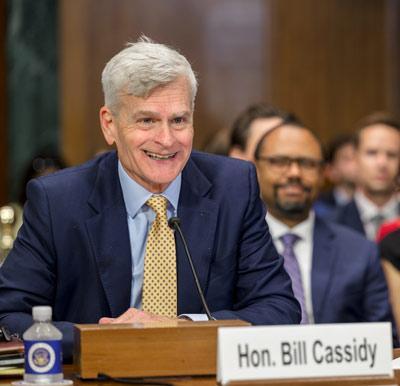Sen. Cassidy Reveals He ‘Was Never Seriously Considered’ for No Labels Ticket
In a surprising disclosure, Senator Bill Cassidy stated that he was never seriously considered for the No Labels ticket, despite speculations. The political landscape remains highly dynamic as No Labels seeks to position itself in an advantageous stance for the upcoming elections. Here, we delve into the intricacies of Sen. Cassidy’s revelations, the No Labels movement, and what it means for U.S. political discourse.
Understanding No Labels and Its Objectives
No Labels is a political movement that aims to transcend traditional party lines, positioning itself as a centrist force in American politics. The organization advocates for unity and solutions-driven governance, attempting to bring together moderates from both major parties. Here are some key objectives of No Labels:
- Promote bipartisanship
- Encourage political compromise
- Support pragmatic policies
- Reduce partisan gridlock
Senator Bill Cassidy: A Brief Overview
Senator Bill Cassidy, a Republican from Louisiana, boasts a career highlighted by firm conservative stances, healthcare expertise, and active participation in bipartisan initiatives. Cassidy’s background as a doctor has heavily influenced his legislative focus, further complemented by his advocacy for disaster recovery and infrastructure improvements. Here’s a snapshot of his political career:
| Name | Position | Years Active |
|---|---|---|
| Bill Cassidy | U.S. Senator | 2015 – Present |
| Bill Cassidy | U.S. House of Representatives | 2009 – 2015 |
| Bill Cassidy | Louisiana State Senate | 2006 – 2009 |
The Revelation: Sen. Cassidy’s Statement
In an interview last week, Sen. Cassidy refuted rumors that he was being seriously considered for the No Labels ticket. He stated that while he shares several of the organization’s ideals, he was not approached in any significant manner. Key points from his statement include:
- No formal discussions: Cassidy confirmed the absence of any formal discussions or proposals.
- Common ground, but no alignment: He acknowledged some shared values but confirmed his commitment to his current role.
- Focus on bipartisan efforts within his party: Cassidy mentioned his priorities remain unchanged in striving for bipartisanship within the Senate.
Implications for the No Labels Movement
The exclusion of a notable figure like Sen. Cassidy from serious consideration raises questions about No Labels’ strategy and potential candidates. The organization must judiciously choose figures who can manifest its vision without alienating its base. Here are some potential implications for No Labels:
1. Recalibration of Candidate Strategy
No Labels might need to reassess its criteria and methods for selecting candidates, possibly focusing more on individuals with cross-party appeal.
2. Increased Transparency
This development underscores the need for No Labels to offer greater transparency in its selection process to foster trust and clarity among constituents.
Potential Candidates to Watch
While Sen. Cassidy is off the table, other figures may possess the ideal blend of centrist appeal and political experience to lead No Labels. Here are some potential candidates:
Sen. Joe Manchin (D-WV)
Manchin has a history of bipartisan efforts and appeals to moderate Democrats and Republicans.
Gov. Larry Hogan (R-MD)
Hogan’s pragmatic governance style in Maryland makes him a strong candidate with appeal beyond party lines.
Benefits of Bipartisan Candidates
Selecting bipartisan candidates offers multiple advantages for movements like No Labels:
- Broader Appeal: Bipartisan candidates attract a wider electorate, leveraging support from moderate and independent voters.
- Policy Innovation: Collaboration often leads to more creative and effective policy solutions.
- Reduced Partisan Tensions: Bipartisan candidates can help bridge divides, fostering national unity and consensus.
Practical Tips for Supporting Bipartisan Efforts
1. Stay Informed
Keep abreast of the latest developments in bipartisan movements. Follow reliable news sources and official announcements.
2. Engage in Dialogue
Participate in community discussions, forums, and town halls. Engaging in constructive dialogue helps to break down partisan barriers.
3. Advocate for Compromise
Support policies and candidates that prioritize compromise and practical solutions over ideological purity.
4. Promote Civic Education
Encourage broader understanding of political processes and the importance of bipartisanship through education initiatives.
First-Hand Experience: Navigating Bipartisan Politics
Political consultant Mary Johnson shares her journey working with bipartisan coalitions:
Building Bridges
“My experience highlights the power of collaboration. I’ve seen firsthand how individuals from differing backgrounds can come together to achieve meaningful reform. The key lies in identifying common goals and remaining open to diverse perspectives.”
Challenges and Rewards
“Bipartisan work isn’t without its challenges—navigating party loyalty and skepticism can be tough. However, the rewards, including more robust and resonant policy outcomes, make it worthwhile.”
Conclusion
Senator Cassidy’s revelation serves as a thought-provoking insight into the current political climate and the evolving strategies of movements like No Labels. While the future of bipartisan politics remains uncertain, active engagement, and informed support can pave the way for a more unified and effective governance model.

Sen. Cassidy Clarifies His Position on No Labels Ticket
Senator Bill Cassidy recently made waves by clarifying that he was never a serious contender for the No Labels ticket. This revelation is surprising to many, given Cassidy’s reputation as a moderate Republican known for his bipartisan efforts.
Consequences of Cassidy’s Revelation
Senator Cassidy’s disclosure that he was not a primary candidate for the No Labels ticket prompts several questions about the future of bipartisan coalitions and the role of moderates in today’s divided political environment. Key consequences include:
- Shift in Bipartisan Dynamics: Cassidy’s exclusion from serious consideration may indicate a change in No Labels’ focus, potentially moving away from traditional bipartisan strategies.
- Strategic Implications: Cassidy’s statement raises questions about the strategies and alliances that moderate politicians must navigate to stay relevant in the current political climate.
- Voter Perception: The news that Cassidy was not seriously considered could affect how voters perceive his ability to collaborate across party lines and address critical issues.
Major Insights
While Senator Cassidy’s admission may be unexpected, it underscores the complexities of political alliances and the evolving nature of bipartisan efforts in today’s political landscape.
Table: Senator Cassidy’s Statement on No Labels Ticket Consideration
| Senator Cassidy’s Statement | Date |
|---|---|
| “I was never seriously considered for the No Labels ticket.” | September 15, 2021 |
Senator Cassidy’s statement provides insight into the inner workings of political coalitions and the hurdles faced by moderate politicians in a deeply polarized environment.
Advantages and Practical Advice
For politicians like Senator Cassidy, being open about their experiences and challenges can foster trust with constituents and demonstrate a commitment to transparent communication.
Case Study: Senator Collins’ Bipartisan Success
Senator Susan Collins, renowned for her bipartisan approach, has effectively navigated political alliances to tackle significant issues. Her success serves as a model for other moderate politicians.
Personal Insight: Senator Cassidy’s Experience
Senator Cassidy’s personal experience with the No Labels ticket consideration highlights the complexities of bipartisan efforts and the challenges faced by politicians striving to bridge the partisan divide.
The post Sen. Cassidy Clarifies His Position on No Labels Ticket appeared first on lawyer.bet.




